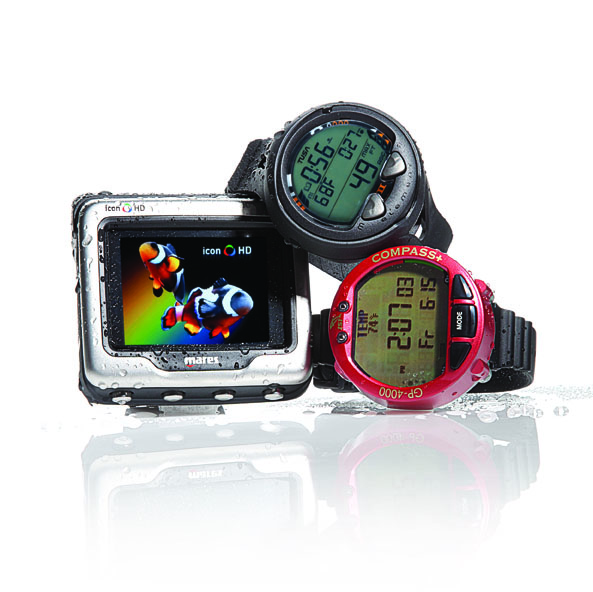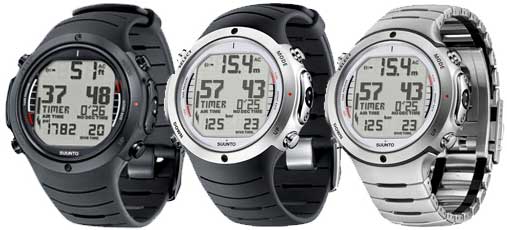I realize a few of you use dive tables, but even more of you don’t. Some don’t because they, like myself, have purchased dive computers and really have no need to regularly use the tables. Frighteningly, others have neither purchased a dive computer nor use the tables regularly. They rely on their buddy, divemaster, guide, or some other divers on the trip to plan their dives for them. This is scary stuff. Seriously.
Once upon a time when I was a new diver and dive computers had just become more mainstream, I completely poo-poo’d them. Only lazy divers unable to comprehend dive tables would spend such large amounts of money to not have to think for themselves. Needless to say, over the years I have changed my tune. Dive computers have become so commonplace and affordable now that there is absolutely no reason not to have one. While I completely and totally feel that all divers need to understand dive tables and their relationship to diving, I feel equally as strong that all divers should have their own dive computer.
Why? Funny you should ask! Let me tell you why.
Longer dives
That’s right. You can dive longer. Why? Because the dive tables assume you’re going to be at the exact same depth for the entire dive. Every single diver in the world knows that’s rarely ever the case. Dive computers take your initial descent into consideration along with any other rising and falling you do during your dive. It’s constantly recalculating (like a GPS!) your available bottom time according to your current depth while taking into consideration all of your past depths and times. It does more than your mind ever could. Well, more than my mind ever could, anyway.

If you’re going to start using Nitrox or already do, the computer’s calculations become even more important. With a nitrox capable computer, you can quickly calculate and compare O2 percentages and depths to determine the optimal mix for your planned dive. Few students really remember how to do that after walking out of their nitrox class, and the computer makes it simple and lightening fast.
Safer dives
Due to the reasons listed above, your dives are also a little safer with a computer if they’re used correctly. You eliminate the human error risk inherent in manual calculations and you eliminate the necessity of trusting someone else to do it for you. Even given the possibility that a dive computer could get it wrong, if you and your buddy both have one then that issue is nearly moot. You both have computers and they both agree, then it’s highly unlikely that both computers are wrong at the exact same time.
Additionally, it can keep track of your previous dives and while you’re on the boat it will scroll through the depths and display to you the current NDL if you were to dive again right then. As your surface time increases, so do those NDL it displays.
Dive log
Dive computers nowadays serve a dual purpose as a dive log. Almost all of them will now store a certain number of dives in memory, and most can be connected to a PC to download the information from your recent dive trip. Some include software that can utilize this information into a dive profile for you that could be useful in determining air consumption habits among other things (if that’s of any interest to you).
Instead of you having to try to remember what your max depth and bottom time was, the computer does that for you. So even if you’re using manual dive logs, the information is right there in front of you to easily copy down. Most even keep track of water temperature too.
Affordable
The cost of dive computers has come down considerably over the years even as their functionality has increased. While there are certainly some pretty expensive models, all that’s necessary is just a basic computer that gives you depth and NDL. You can get one for under $200 easy, even closer to $100 if you happen to catch a sale. How much is your peace of mind worth?
Increasingly required
Yup, more and more dive operators are starting to require that you have a dive computer before diving with them, especially if you’re doing more advanced dives. Sometimes you can rent one, and while that may be necessary at times, wouldn’t you rather use a computer you’re familiar with? It would be a shame to be caught unsuspecting on your next dive vacation by finding out that the dive operator you booked with requires you to have a computer and you don’t have one. So until you get one, make sure what the rules are with the shops you’re diving with.
Word of caution
Dive computers aren’t infallible. Their purpose is to help keep you from getting bent by doing rapid and continuous calculations of your bottom time and depth. They cannot, however, take into consideration other DCS risk factors such as weight, age, hydration levels, and the fact that you stayed out all night partying. For that matter, it knows nothing about your specific body and it’s health. For that reason, dive computers should be seen as a tool and nothing more. As with any tool, understand how to use it before doing so and never let it take the place of safe diving knowledge. Do your training, learn the tables, understand the science behind them and then use the computer to help you facilitate the use of that knowledge in a safe manner.
For me personally, a dive computer is a necessary part of my gear and in my not so humble opinion, there’s really no excuse not to have one.


